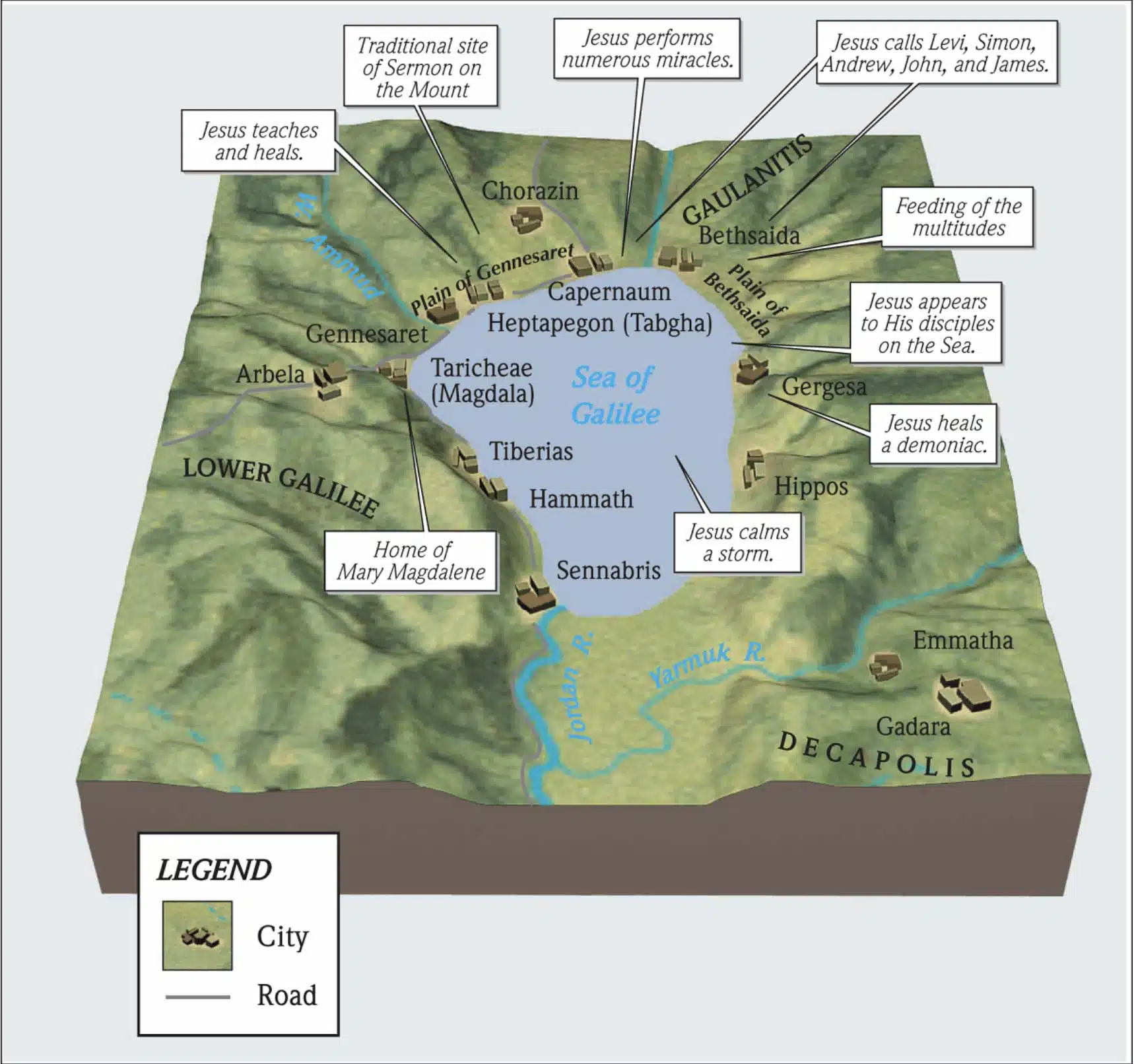Two blind men follow Jesus, begging Him to heal them. They call Jesus by the Messianic title, “Son of David.” Jesus privately heals them according to their faith. Before leaving He clearly warns them not to tell others what He did for them. They tell everyone anyway.
There is no apparent parallel account of Matthew 9:27-31 in the Gospels. A similar miracle is described in Matthew 20:29-34, Mark 10:46-51 and Luke 18:35-43.
As Jesus went on from there (where He raised back to life the daughter of the synagogue official) two blind men followed Him (v 27).
Blindness was a terrible condition throughout the ancient world. Among the worst of its negative effects was that there was very little or even no work available for the blind to do in order to sustain themselves. Leviticus lists forbidden defects that prevent a man from approaching the altar or offerings to the Lord and therefore render him ineligible from serving as a priest. Blindness is the first to be named (Leviticus 21:18-23). Without work, blind men were often reduced to roadside beggars who were at the mercy of those who passed them by. The Law of Moses expected them to be cared for. It forbade anyone from taking abusive disadvantage of anyone who was blind. “Cursed is he who misleads a blind person on the road” (Deuteronomy 27:18).
The Bible occasionally used physical blindness as a metaphor to depict spiritual blindness (Isaiah 42:19; Matthew 23:17, 19, 24, 26; John 9:39-41; Romans 2:19; 2 Peter 1:9). One of the dangers of spiritual blindness, is that those who are spiritually blind often do not recognize that they cannot see (Revelation 3:17). In Matthew 15:14, Jesus shares a memorable parable about how the Pharisees, who suffer from spiritual blindness, are as ridiculous as blind men guiding other blind men where to go: “Let them alone; they are blind guides of the blind. And if a blind man guides a blind man, both will fall into a pit.”
The two blind men who followed Jesus as He went on begged Him for help (v 27). They were continually pleading with Him and crying out to Him as evidenced by the continuous aspect Matthew uses for crying out. The word “krazo” (G2896), is written in this verse as a continuous participle, which describes an on-going or recurring action, as opposed to a singular event. The scene Matthew portrays is that the two blind men were repeatedly crying out to Jesus, “Have mercy on us, Son of David!” (v 27). In the process they were attracting much attention. The mercy they wanted Jesus to bestow on them was to give them their sight. As they begged for this mercy, Jesus appears to have kept walking, and somehow, they managed to follow Him. The text does not suggest that Jesus was trying to escape the two blind men. Perhaps He was seeking a less public place to heal them and avoid increasing His profile any further.
The two blind men called Jesus, “Son of David” (v 27). David was a famous King in Israel who ruled the united kingdoms of Israel and Judah from 1005-965 B.C. He was known as a man after God’s own heart (1 Samuel 13:14). And it was to David that God made a covenant, and promised to make an everlasting kingdom and house, and have David’s heir sit on the throne forever.
“The Lord also declares to you that the Lord will make a house for you. When your days are complete and you lie down with your fathers, I will raise up your descendant after you, who will come forth from you, and I will establish his kingdom. He shall build a house for My name, and I will establish the throne of his kingdom forever. I will be a father to him and he will be a son to Me; when he commits iniquity, I will correct him with the rod of men and the strokes of the sons of men, but My lovingkindness shall not depart from him, as I took it away from Saul, whom I removed from before you. Your house and your kingdom shall endure before Me forever; your throne shall be established forever.”(2 Samuel 7:11-16)
After this promise, at any point throughout Jewish history, the term Son of David was understood as an overt Messianic designation. In this era where Messianic hopes ran high, it unmistakably announced what was on many Jews’s minds. Could this miracle-working Rabbi, who preaches of the coming heavenly kingdom, be the long-awaited Messiah?
These two blind men were publicly proclaiming the true identity of Jesus as the promised Messiah.
This is a significant moment in Matthew’s gospel. Matthew told us that Jesus is the Messiah and the son of David from the very first sentence of his account (Matthew 1:1). Angels affirmed this to Joseph, husband to Mary, in a dream (Matthew 1:20). Magi from the east showed up to worship the King of the Jews following a mysterious star that led them to Bethlehem, the city of David, where Jesus was born (Matthew 2:1-10). Matthew has repeatedly pointed out how the circumstances surrounding Jesus’s life and the actions He took have fulfilled numerous Messianic prophecies (Matthew 1:22-23, 2:5-6, 2:15, 2:16-18, 2:23, 3:1-3, 4:5-6, 4:13-16, 5:17, 8:17).
By publicly referring to Himself with the everyday expression, “Son of Man,” Jesus has subtly hinted and quietly alluded to the fact that He is the Messiah (Matthew 8:20, 9:6). But this declaration by the two blind men is the first instance in Jesus’s public ministry, as recorded by Matthew, where other people are beginning to connect the dots and openly state their hopeful conclusions about who He is. And ironically it is two blind men. The two blind men can see through the eyes of faith what the religious leaders cannot identify with fully functioning sight.
At this point in His ministry, Jesus does not appear to desire His identity as the Messiah to spread. This could be the reason He did not heal them in the street in front of everyone to witness. To have done so would have publicly verified what the two blind men were crying out about Him. Notice how Jesus does not touch and open their eyes until after He entered the house.
When He entered the house, the blind men came up to Him (v 28). Jesus asked them a question. Do you believe that I am able to do this? (v 29). He asked about their faith in Him. Throughout the specific miracles so far in the book of Matthew, faith in Jesus’s ability and person is often a common theme. The leper who came to Jesus demonstrated faith (Matthew 8:2). Jesus marveled at the Roman Centurion’s faith in Him (Matthew 8:10). Matthew points out that Jesus noticed the faith of the paralytic’s friends (Matthew 9:2). And as He healed her, Jesus told the hemorrhaging woman that “your faith has made you well” (Matthew 9:22). Jesus responds to faith. He is pleased by it.
“And without faith it is impossible to please Him, for he who comes to God must believe that He is and that He is a rewarder of those who seek Him.”
(Hebrews 11:6)
The blind men answered Jesus’s question, Do you believe that I am able to do this? with faith (v 28). They simply said to Him, “Yes Lord” (v 28). Matthew writes, Then He touched their eyes, saying, “It shall be done to you according to your faith” (v 29). And their eyes were opened (v 30). The Messiah showed them mercy and rewarded them with their sight according to their faith (v 29).
It is interesting how many of Jesus’s miracles of physical healing are themselves, in some respect, metaphorical depictions of the spiritual healing He offers. By healing lepers from the nerve-numbing and degenerative disease of leprosy and the death it brings, Jesus depicts how He heals sinners from the soul-numbing and degenerative disease of sin. By raising the physically dead back to life, Jesus provides a glimpse of the resurrection of eternal life that is found in Him. But few of these miracle-metaphors are so obvious as His giving sight to the blind. John makes much of this in a different instance where Jesus healed a blind man in John 9. And so too does Matthew, in his own style, with his placement and telling of this encounter.
Throughout this chapter, the Pharisees are depicted as blind for hardening their hearts and refusing to see the truth about Jesus. In this chapter’s conclusion, the people of Galilee are depicted as blind, aimless, and distressed. They are blind to who Jesus is. They are blind to His kingdom. They are blind to their sin. They are blind to what Jesus offers them. They are blind to how they should live. And they are blind to what distresses them. The people, like these two blind beggars, are in desperate need of mercy from the Son of David to open their eyes to the reality of the gospel. Matthew suggests these things, by choosing to tell of this particular miracle how and when he does.
After Jesus opened their eyes, He sternly warned the two blind men (v 30). The Greek term Matthew uses for sternly warned is a peculiar one. It is the verb “embrimaomai” (G1690). It means to “earnestly charge,” “threaten,” “murmur against,” or “groan.” It is used in only five verses of the New Testament. In this verse it is used as a warning. And it is used similarly in Mark 1:43. In Mark 14:5 it is used as grumbling admonition when some of the disciples became upset at the woman who used her expensive perfume to anoint Jesus. And it is used twice by John to depict Jesus’s inner groaning at the death of His friend, Lazarus (John 11:33, John 11:38). Through each of these uses, “embrimaomai” seems to describe a guttural frustration. When Jesus sternly warned the two blind men, “See that no one knows about this!” (v 30). Jesus earnestly meant it and they knew it. He really, really did not want people to know about this.
But the wonder of it all appears to have been too good for them to keep a secret, and they went out and spread the news about Him throughout all that land anyway (v 31).
Biblical Text
27 As Jesus went on from there, two blind men followed Him, crying out, “Have mercy on us, Son of David!” 28 When He entered the house, the blind men came up to Him, and Jesus said to them, “Do you believe that I am able to do this?” They said to Him, “Yes, Lord.” 29 Then He touched their eyes, saying, “It shall be done to you according to your faith.” 30 And their eyes were opened. And Jesus sternly warned them: “See that no one knows about this!” 31 But they went out and spread the news about Him throughout all that land.
Check out our other commentaries:
-
Matthew 6:33 meaning
Jesus crystalizes what He has been teaching His disciples when He tells them to “seek first His kingdom and His righteousness.” If they do this,...... -
2 Timothy 3:1-9 meaning
Paul warns Timothy of the way men will behave in the last days before Christ’s return. Men will love themselves only, seek money, elevate themselves,...... -
Genesis 24:10-15 meaning
Abraham’s servant loads ten camels with costly gifts and journeys to the city of Haran in Mesopotamia. At the well there, the servant prays for...... -
Exodus 29:15-18 meaning
The LORD describes another sin offering requiring a ram....... -
Genesis 22:9-12 meaning
Abraham binds Isaac and places him on an altar. As Abraham takes the knife to slay his son, the angel of the Lord calls to......




